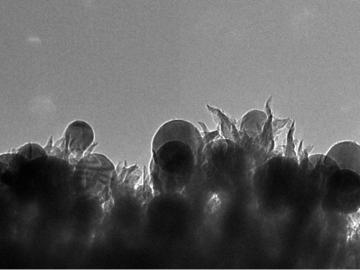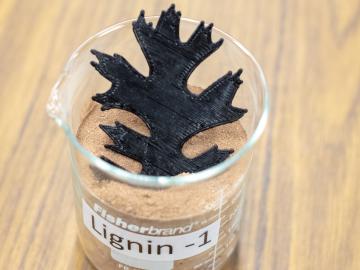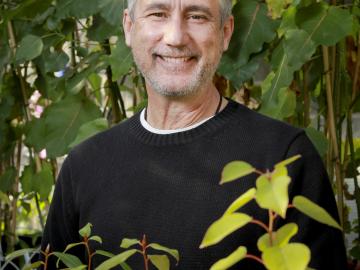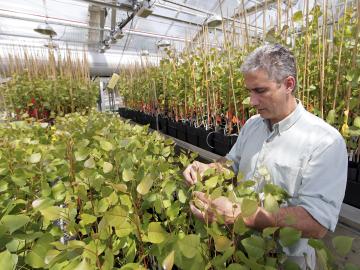Filter News
Area of Research
- Advanced Manufacturing (2)
- Biological Systems (2)
- Biology and Environment (46)
- Clean Energy (32)
- Fusion and Fission (7)
- Fusion Energy (7)
- Materials (15)
- Materials for Computing (1)
- National Security (3)
- Neutron Science (7)
- Nuclear Science and Technology (12)
- Nuclear Systems Modeling, Simulation and Validation (1)
- Quantum information Science (1)
- Supercomputing (10)
News Topics
- (-) Advanced Reactors (34)
- (-) Bioenergy (88)
- 3-D Printing/Advanced Manufacturing (116)
- Artificial Intelligence (87)
- Big Data (50)
- Biology (96)
- Biomedical (58)
- Biotechnology (21)
- Buildings (54)
- Chemical Sciences (60)
- Clean Water (29)
- Climate Change (94)
- Composites (25)
- Computer Science (184)
- Coronavirus (46)
- Critical Materials (24)
- Cybersecurity (35)
- Decarbonization (74)
- Education (4)
- Element Discovery (1)
- Emergency (2)
- Energy Storage (107)
- Environment (192)
- Exascale Computing (36)
- Fossil Energy (5)
- Frontier (41)
- Fusion (53)
- Grid (61)
- High-Performance Computing (83)
- Hydropower (11)
- Irradiation (3)
- Isotopes (49)
- ITER (7)
- Machine Learning (46)
- Materials (140)
- Materials Science (135)
- Mathematics (6)
- Mercury (12)
- Microelectronics (2)
- Microscopy (51)
- Molten Salt (8)
- Nanotechnology (60)
- National Security (59)
- Net Zero (12)
- Neutron Science (130)
- Nuclear Energy (105)
- Partnerships (40)
- Physics (59)
- Polymers (31)
- Quantum Computing (31)
- Quantum Science (66)
- Renewable Energy (2)
- Security (24)
- Simulation (45)
- Software (1)
- Space Exploration (25)
- Statistics (3)
- Summit (57)
- Sustainable Energy (120)
- Transformational Challenge Reactor (7)
- Transportation (93)
Media Contacts

In a step toward advancing small modular nuclear reactor designs, scientists at Oak Ridge National Laboratory have run reactor simulations on ORNL supercomputer Summit with greater-than-expected computational efficiency.

OAK RIDGE, Tenn., March 1, 2019—ReactWell, LLC, has licensed a novel waste-to-fuel technology from the Department of Energy’s Oak Ridge National Laboratory to improve energy conversion methods for cleaner, more efficient oil and gas, chemical and
![Coexpression_hi-res_image[1].jpg Coexpression_hi-res_image[1].jpg](/sites/default/files/styles/list_page_thumbnail/public/Coexpression_hi-res_image%5B1%5D_0.jpg?itok=OnLe-krT)
While studying the genes in poplar trees that control callus formation, scientists at Oak Ridge National Laboratory have uncovered genetic networks at the root of tumor formation in several human cancers.

The Department of Energy’s Oak Ridge National Laboratory is collaborating with industry on six new projects focused on advancing commercial nuclear energy technologies that offer potential improvements to current nuclear reactors and move new reactor designs closer to deployment.

Scientists at the Department of Energy’s Oak Ridge National Laboratory have created a recipe for a renewable 3D printing feedstock that could spur a profitable new use for an intractable biorefinery byproduct: lignin.
Scientists studying a valuable, but vulnerable, species of poplar have identified the genetic mechanism responsible for the species’ inability to resist a pervasive and deadly disease. Their finding, published in the Proceedings of the National Academy of Sciences, could lead to more successful hybrid poplar varieties for increased biofuels and forestry production and protect native trees against infection.

With the licensing to Enchi Corporation of a microbe custom-designed to produce ethanol efficiently, Oak Ridge National Laboratory (ORNL) and the BioEnergy Science Center (BESC) mark the culmination of 10 years’ research into ways to improve biofuels production. Enchi ha...

The Department of Energy has announced funding for new research centers to accelerate the development of specialty plants and processes for a new generation of biofuels and bioproducts. The Center for Bioenergy Innovation (CBI), led by Oak Ridge National Laboratory...

It’s been 10 years since the Department of Energy first established a BioEnergy Science Center (BESC) at Oak Ridge National Laboratory, and researcher Gerald “Jerry” Tuskan has used that time and the lab’s and center’s resources and tools to make good on his college dreams of usi...

Researchers at the Department of Energy’s Oak Ridge National Laboratory are the first team to sequence the entire genome of the Clostridium autoethanogenum bacterium, which is used to sustainably produce fuel and chemicals from a range of raw materials, including gases derived from biomass and industrial wastes.




